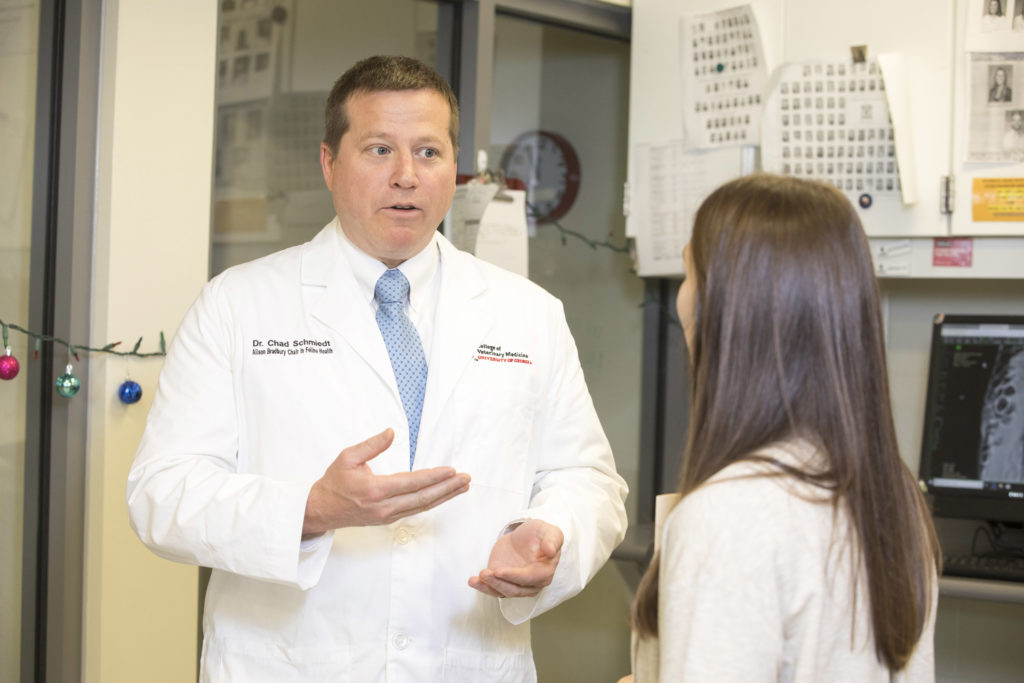Chad Schmiedt, a professor in the College of Veterinary Medicine, conducts research that explores how chronic kidney disease in companion animals starts and progresses. The ultimate goal is to improve the lives of cats, dogs and the people who care for them.
When did you come to UGA and what brought you here?
I grew up in Charleston, South Carolina, went to Clemson, and originally came to UGA as a veterinary student in 1996. I returned just over 10 years later as a faculty member. Having been here as a student, I intimately knew and revered Athens and UGA. I was excited to rejoin the community as a faculty member. I came back to UGA because I knew it was a place where internationally recognized mentors would challenge me as a young faculty member, a place with a commitment to the highest levels of veterinary care, and I thought Athens would be a great place to live.
What are your favorite courses and why?
My favorite course is the fourth-year soft tissue surgery clinical rotation. The veterinary teaching hospital offers world-class care, which is incredibly exciting to be a part of that and to contribute to, but it also can be a marvelous classroom. Our cases are difficult; they require a team approach with constant problem solving and tedious attention to detail. In the fourth-year, veterinary students have a reasonable medical foundation and can really engage with these cases. It is wonderful to see the students “get it” as they work with our patients, hand-in-hand with the veterinarians in the hospital, and progress from tentative students to confident clinicians. We also train interns and surgical residents, and enabling their growth and success is also incredibly rewarding.
How do you describe the scope and impact of your research or scholarship to people outside of your field?
My research is done primarily to improve our understanding of common diseases of companion animals. Of particular interest to me is understanding why chronic kidney disease starts and how it progresses. This is an all-too-common disease in cats and dogs, and little progress has been made in understanding and treating it in some time. Because people frequently suffer from kidney disease as well, there are plenty of opportunities for translational research. The more we learn about this and other diseases in animals, the more we understand about these diseases in people, and vice versa. Additionally, beyond kidney disease, we are constantly asking questions about other diseases or techniques in companion animals in an attempt to improve the veterinary care we provide. In the end, I want my research to improve the lives of cats, dogs, and the people who care for them.

How does your research or scholarship inspire your teaching, and vice versa?
My job is to educate the next generation of veterinarians and veterinary surgeons. My research interests are centered on understanding the diseases of the species we treat every day. The two exist together and are intimately connected. The more questions you ask, the better you understand what we know and don’t know. Critical evaluation of our current knowledge is essential in research, and teaching that to students is a critical part of educating a doctor.
What do you hope students gain from their classroom experience with you?
My main focus is to reinforce the basic principles of surgery and wound healing and teach students how to think critically and solve problems. There is no way someone could master all aspects of the practice of veterinary medicine in four years; I have been practicing for 20 years and still have a lot to learn. If you can focus on mastery of the basic principles of medicine and surgery, learn how to logically problem solve, know where to go to get more information, and establish open and honest communication with clients and colleagues, you can be a successful veterinarian.
The one UGA experience I will always remember will be …
My favorite memory is coming back home. After graduation from UGA, I moved to Knoxville, then Dallas, and then to Madison, Wisconsin, for five years to complete a surgery residency and clinical instructorship. Years after graduating, I was excited there was a job opportunity at UGA and came to interview in early April—when the dogwoods and azaleas were blooming, the grass was lush and green, and our verdant Southern spring was moving forward in full force. Having just come from a town locked in the grey doldrums of a late Midwestern winter, it was so wonderful to be back home in Athens. They say you never know what you had until it’s gone; well, that was my experience coming home. The campus, the people, the town, the Southern charms, the food, the beautiful countryside, the whole energy of the place—all those wonderful memories came flooding back in a relatively short period of time … and then I got the job. It was an incredible homecoming.


